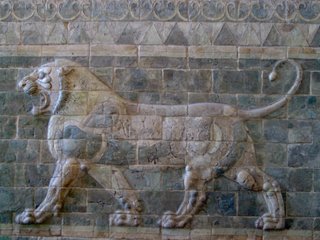
How did it get there?
"My goodness, were there that many vases? Is it possible that there were that many vases in the whole country?'"
Donald Rumsfeld (Secretary of State) on being told of the plunder of the Baghdad National Museum in 2003.
I am upset about this. Today I began a new topic in my research. Looking at the possible subjective properties of media by material types. Specifically the scroll, the clay tablet and the codex. How one reads each makes for different types of readers. But this is not why I am writing here.
Through the excellent essay "The Physical Media: Tablet, Scroll, Codex" by Michael W Haslam found in A Companion to Ancient Epic Edited by John Miles Foley (Malden: Blackwell Publishing 2005) I spent some time becoming acquainted with early forms of text. What amazing things. Then I start looking on the net for information regarding cuneiform texts. They are being sold on eBay! Along with a lot of other probably stolen antiquities. According to David I. Owen, a professor at the Department of Near Eastern Studies at Cornell University "Everything is coming out of Iraq these days -- statuary, cuneiform tablets, cylinder seals,".
With the chaos of war comes those who see the chance to make money. The less technologically sophisticated of this pack of creatures are the plunderers of Iraq:
"It's a cultural disaster," said U.N. official Mounir Bouchenaki.
"The biggest we've ever seen," agreed University of South Florida professor of religious studies and longtime Middle East archaeologist James Strange. "The thieves stake out the sites like they would stake a claim on a mine. No one is enforcing the law."
How many cuneiform tablets there are in Iraq is not known but the ancient city of Nineveh has been excavated by archeologists for 150 years (yes one five zero) and they have only uncovered 40% (four zero) of it. Today "the Sennacherib Palace site museum at Nineveh represents a world heritage disaster of the first magnitude" (Stolen Stones: The Modern Sack of Nineveh by John Malcolm Russell) Ninevah was situated on the east bank of the Tigris near modern Mosul.
Cuneiform is our (humanity's) earliest known writing. These artifacts are the property of all. The artifacts and cultural heritage of the region deserves to have a significant percentage of the billions that the USA is spending. Several million could be used to protect what "may be between 20,000 and 100,000 ancient sites in Iraq, ranging from mounds to storied cities like Babylon and Nineveh" (National Geographic).
Only 20 of the "Iraq Museum's entire collection of 4,795 seals that were stolen." in 2003 have been recovered. (Art Loss in Iraq)
THE 1954 HAGUE CONVENTION
Parties must undertake preparations in time of peace against the foreseeable effects of armed conflict and prohibit:
*any use of the cultural property in a manner that will likely expose it to destruction or damage in the event of an armed conflict.
*the commission of any acts of hostility or reprisal against cultural property except for reasons of military necessity.
*any form of theft, pillage, or misappropriation of cultural property.
More information on this crime during war here:
The Iraq War and Archeology
Cuneiform Library Initiative
1 comment:
a lot of times when there was a raid or even just a visit... we would notice people would use works of art to level their tables as a shim. some times there would be a pile of crap in a compost heap and there would be tapestries with garbage. if the locals would give us this stuff as a token we would get in trouble for bringing it home. to learn my lesson i would check it out with the Baghdad museum and the minister of culture. even with this we would get in trouble with permission and trying to save art. if we don;t preserve the art the middle eastern fold will not. they value family, heritage, honor, and other important things. if they cannot secure the safety of their families they could care less about art and history.
Post a Comment